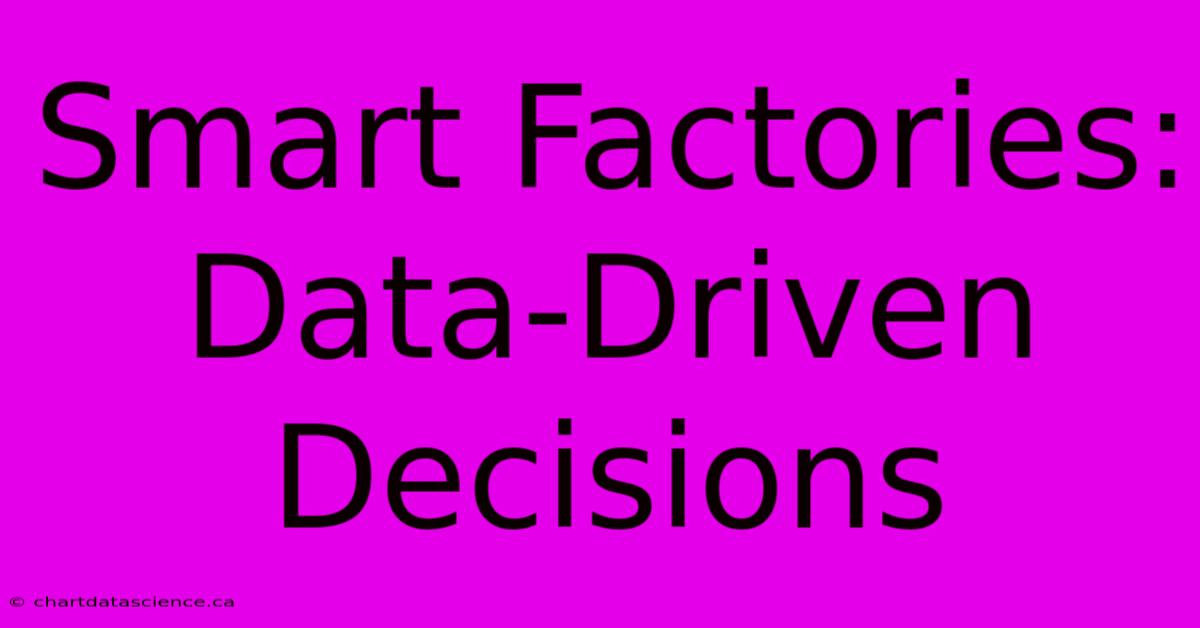Smart Factories: Data-Driven Decisions

Discover more detailed and exciting information on our website. Click the link below to start your adventure: Visit My Website. Don't miss out!
Table of Contents
Smart Factories: Data-Driven Decisions for a Brighter Future
Smart factories are all the rage these days, but what are they really all about? Think of them as the next evolution of manufacturing, where machines talk to each other, data is king, and decisions are made with lightning speed. It's all about using technology to make factories smarter, more efficient, and ultimately, more profitable.
So, how do smart factories actually work?
The magic happens through data. Imagine a factory floor where sensors are collecting real-time information on everything from machine performance to inventory levels. This data is then analyzed using artificial intelligence (AI) and machine learning (ML) to identify trends, predict issues before they occur, and optimize processes in a way that would be impossible for humans to do manually.
What are the benefits of a data-driven factory?
- Increased Efficiency: Smart factories can reduce downtime, optimize resource allocation, and even predict maintenance needs before they arise.
- Improved Quality: Data analysis can help identify and eliminate defects, resulting in higher quality products.
- Enhanced Flexibility: Smart factories can easily adapt to changing customer demands and market conditions.
- Reduced Costs: By streamlining processes and minimizing waste, smart factories can significantly lower production costs.
Real-World Examples:
- Predictive Maintenance: Sensors monitor the health of machines, alerting engineers to potential problems before they happen. This prevents costly downtime and unexpected repairs.
- Inventory Optimization: Real-time data on inventory levels allows factories to minimize waste and ensure they always have the right materials on hand.
- Automated Quality Control: AI-powered systems can identify and reject defective products before they leave the factory floor, improving overall product quality.
Challenges and Considerations:
- Data Security: Protecting sensitive data from cyberattacks is crucial in a data-driven factory.
- Integration: Connecting different systems and technologies can be complex and time-consuming.
- Skills Gap: Finding and training employees with the necessary data analytics skills can be a challenge.
The Future is Smart:
Smart factories are more than just a buzzword; they're the future of manufacturing. By harnessing the power of data, these factories are poised to transform industries, improve efficiency, and drive innovation. If you want to stay ahead of the curve, it's time to embrace the data-driven future of manufacturing.

Thank you for visiting our website wich cover about Smart Factories: Data-Driven Decisions. We hope the information provided has been useful to you. Feel free to contact us if you have any questions or need further assistance. See you next time and dont miss to bookmark.
Also read the following articles
| Article Title | Date |
|---|---|
| No Malaysian Casualties In Recent Thailand Attack | Oct 24, 2024 |
| Hurricane Kristy Path Storm Strengthens | Oct 24, 2024 |
| Man Citys Prague Win Player Ratings And Haaland | Oct 24, 2024 |
| Sixers Face Nba Scrutiny Over Embiids Absence | Oct 24, 2024 |
| Disposable Vapes Facing Ban In England | Oct 24, 2024 |
